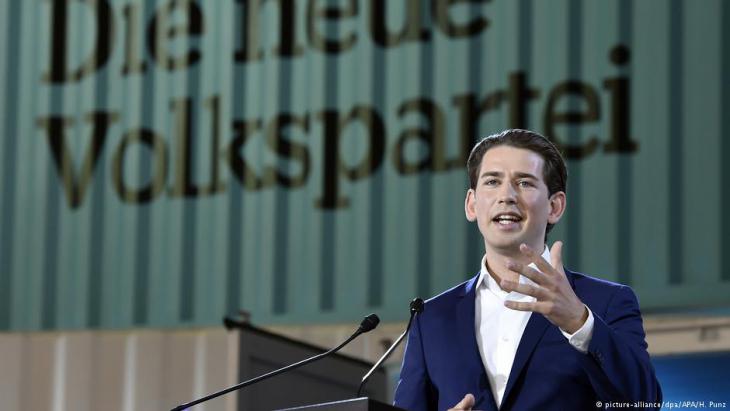
October elections in Austria: Beware of Islamophobes
With the campaign for elections to the Austrian National Council in full swing, a gloomy picture is already emerging on the issue of Islam. Since 2008, Austria′s Muslim population, largely made up of low-skilled workers, has felt its views to be adequately represented by the Social Democratic-led grand coalition government.
In 2011, however, saw a youthful Sebastian Kurz enter parliament. Quick to take over leadership of the venerable Christian Democratic OVP, he has since rebranded the tradition-steeped ′black′ party in vibrant turquoise. Initially he was put in charge of led the newly-launched national integration office at the Interior Ministry. Now, as both integration and foreign minister, he is the man responsible for setting the tone when it comes to Austrian policy on Islam.
Yet the hopes placed by many Muslims in a Social Democratic-led government supported by initially liberal overtures from the OVP, which clearly acknowledged Islam to be part of Austria, were soon dashed.
Islam legislation harking back to the Habsburgs
Matters came to a head in 2015, with the introduction of a new Islam law – legislation that had been long in the making. It was passed under a hailstorm of criticism from religious legal experts and cemented the extremely traditional Islam law dating from 1912, when Austria was still ruled by the Habsburg monarchy.
Unlike the 1912 law, which also addressed other church and religious groups, the 2015 law set the course for a new era of legal discrimination aimed specifically at the Islamic community.
And the trend continued. The integration law was passed in 2017. This introduced a ban on face veils, which will come into force on 1 October and stipulates that anyone caught wearing a niqab or full-face veil pay a cash fine. Banning Muslim women from wearing any kind of hair covering was also discussed.
With reference to current regulations, it was argued that female police officers, public prosecutors and judges are not able anyway to wear the so-called ′headscarf′ – hence its omission from the new law.
Jumping on the populist bandwagon
With a clever play on the word ′Kern′, which is the name of the Austrian Chancellor and also means ′essence′, the Green Party campaign slogan ′Im Kern ist Kurz ein Strache′ (′Kurz is essentially a Strache′) appears on posters illustrated with the image of a chameleon aimed at symbolising the uniform political hue of the three chancellor candidates. And on the issue of the Islam question, the Greens definitely have a point.
The campaign provides clear evidence of this. Take, for instance, the video message published by the serving chancellor and leader of the Social Democratic Party (SPO), Christian Kern, under the title ′#kernunterwegs am Stammtisch′ (Kern on the road at the regulars′ table), in which the chancellor explains that he aims to listen to those problems “that are of burning interest to people.”
He goes on to say that these problems “should be noted” and that one must “listen to the truth.” In a bid to win back the older voters who have gone over to the right-wing populist Freedom Party, Kern talks to a female senior citizen and in doing so largely validates racist basic assumptions concerning Islam and Muslims.
And instead of the Chancellor facilitating a more sophisticated view of the “truths” covered in the video, he takes the same line: confirming, for example, the stereotypical image of the misogynist Muslim man. When the senior citizen begins talking about the Karntnerstrasse, a famous street in central Vienna revered as a “shrine”, she complains about “people with burkas” and Kern is heard confidently referring to the fact that a ban on the face veil will soon be introduced.
Yes. Quite different tones to those heard in the party political broadcast “Kern liest bose Tweets” (Kern reads nasty Tweets), where he could still be heard explaining to viewers that people out there have different problems to those invented on Twitter. But that video was also about defending the class-struggle election slogan “Hol dir, was dir zusteht” (Take what you′re entitled to). And not about respect for a minority.
Read the full article here.

 Search
Search